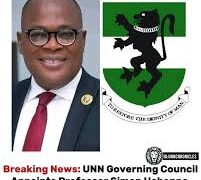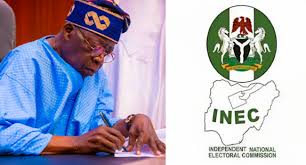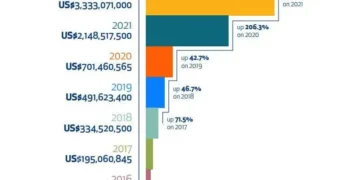Abuja, Nigeria – Nigeria’s fragile democracy is once again in the spotlight as the nation grapples with the sudden and controversial decision to place Prof. Mahmood Yakubu, Chairman of the Independent National Electoral Commission (INEC), on compulsory leave. President Bola Ahmed Tinubu’s directive—coming just three months before the expiration of Yakubu’s tenure in December 2025—has ignited heated debates across political circles, civil society, and the electorate.
While the presidency has remained tight-lipped, insider sources reveal that the real reasons behind Yakubu’s premature exit revolve around political intrigue orchestrated by Imo State Governor, Hope Uzodimma. According to reports, Uzodimma raised two damning allegations against Yakubu: his decision to allow the registration of new opposition political parties against the ruling All Progressives Congress (APC)’s wishes, and his alleged covert support for a gubernatorial aspirant in Imo State opposed by the governor.
This exclusive News Global TV investigation unpacks these allegations, situates them within the larger political context, and analyzes what Yakubu’s abrupt exit means for Nigeria’s democracy, the APC’s political strategy, and the looming 2027 elections. Thus, this has been described by many analyst as a Political Earthquake at the Heart of Nigeria’s Democracy.
The Falling-Out: From Trusted Ally to Political Liability
Prof. Mahmood Yakubu was once seen as an indispensable ally of the APC-led federal government. Appointed in 2015 by then-President Muhammadu Buhari and reappointed in 2020, Yakubu’s leadership of INEC has been defined by reforms, controversies, and intense public scrutiny. His introduction of technological innovations such as the Bimodal Voter Accreditation System (BVAS) and electronic transmission of results was hailed as revolutionary, but his failure to deliver consistently credible elections has drawn criticism from multiple quarters.
However, Yakubu’s relationship with the ruling party appears to have soured in recent months. Governor Hope Uzodimma, one of APC’s influential powerbrokers and Chairman of the Progressive Governors’ Forum, allegedly played a central role in convincing President Tinubu that Yakubu could no longer be trusted to protect the ruling party’s interests ahead of 2027.
Allegation One: Registration of Opposition Political Parties
The first allegation centers on Yakubu’s decision to allow the registration of several new opposition political parties. According to Uzodimma, this move was a direct affront to the ruling APC’s strategic interests. For the governor, the timing was particularly troubling: Yakubu permitted the registrations toward the twilight of his tenure, a period when the APC leadership expected INEC to limit activities that could destabilize the political landscape.
Why This Matters to APC:
Political analysts suggest that the proliferation of opposition parties poses a grave threat to APC’s dominance in the run-up to 2027. While Nigeria already has over 18 registered political parties, the entry of new groups—particularly those with strong regional bases or popular grassroots appeal—could fracture the political field, making it harder for APC to consolidate votes.
For a ruling party determined to secure Tinubu’s re-election, the emergence of fresh opposition platforms could disrupt carefully laid plans. It risks creating new coalitions capable of mobilizing disenchanted voters, particularly in areas where APC’s popularity has waned since the controversial 2023 elections.
The Fallout:
Governor Uzodimma reportedly told President Tinubu that Yakubu’s actions amounted to betrayal, especially considering that the APC expected a more cautious approach from the electoral umpire at such a sensitive political moment. The narrative of “last-minute sabotage” gained traction within the presidency, fueling suspicion that Yakubu was no longer aligned with the ruling party’s agenda.
Allegation Two: Covert Support for an Imo Gubernatorial Aspirant:
The second and arguably more explosive allegation is that Yakubu was covertly supporting one of the aspirants in the Imo State governorship race, against Governor Uzodimma’s preferred choice. According to sources, Uzodimma accused Yakubu of not only turning a blind eye to certain irregularities favoring the aspirant but also granting quiet approvals that emboldened the candidate’s camp.
Why This Was a Red Line for Uzodimma.
In the high-stakes world of Nigerian politics, gubernatorial elections often serve as battlegrounds for broader power struggles. For Uzodimma, retaining control of Imo State is critical to his political survival and influence within the APC. Any perception that INEC’s leadership was tilting in favor of an opponent represented an existential threat.
The governor’s alarm reportedly intensified after intelligence suggested Yakubu’s actions could embolden rival factions within APC and opposition parties in the southeast. This, Uzodimma argued, could fracture APC’s unity and weaken its electoral machinery ahead of 2027.
The Presidential Response:
Sources indicate that Uzodimma’s briefing to Tinubu, shortly after the president’s return from a 12-day working vacation, convinced him that Yakubu had become a liability. Within days, the directive was issued for Yakubu to proceed on terminal leave. The speed of the decision underscored how far trust had eroded between the INEC chairman and the ruling establishment.
Immediate Fallout: Disruptions at INEC:
Yakubu’s sudden exit has thrown INEC into disarray. His planned quarterly consultative meeting with political parties was abruptly canceled, as was a scheduled engagement with civil society organizations. Staff morale reportedly dipped, with many employees uncertain about the future direction of the commission. Critics argue that forcing Yakubu out just months before his tenure’s expiration undermines institutional stability. They warn that such political interference could weaken INEC’s credibility and erode public confidence in the electoral process.
The Tinubu Factor: Political Calculations Ahead of 2027:
President Tinubu’s decision must be viewed within the larger context of his political calculations for 2027. After a contentious 2023 election that left many Nigerians disillusioned, the president is keenly aware of the need to control all variables ahead of his re-election bid. Ensuring that INEC is headed by a chairman aligned with his administration’s interests is seen as a crucial step in securing that outcome.
By asking Yakubu to step aside, Tinubu signals his determination to remove any potential obstacles, even if doing so risks public backlash. The move also demonstrates the influence of APC governors, particularly Uzodimma, in shaping national political decisions.
The Emergence of Prof. Joash Ojo Amupitan: Tinubu’s Likely Choice
As Yakubu exits, all eyes are now on his likely successor, Prof. Joash Ojo Amupitan (SAN). A respected academic and legal luminary, Amupitan boasts over 34 years of professional experience and has held senior administrative roles at the University of Jos, where he currently serves as Deputy Vice-Chancellor (Administration).
Amupitan’s Profile:
• Born in Ijumu LGA, Kogi State.
• Law graduate from University of Jos (1987).
• Called to the Nigerian Bar in 1988.
• Obtained an LL.M. in 1993 and a Ph.D. in 2007.
• Appointed Professor of Law in 2008.
• Conferred with SAN title in 2014.
• Served as Dean of Law, member of various university governing councils, and currently Pro-Chancellor of Joseph Ayo Babalola University.
Why Amupitan?
Insiders suggest Amupitan’s deep knowledge of electoral law, corporate governance, and legal reforms makes him a fitting candidate to lead INEC into the future. However, his perceived closeness to political elites raises concerns about whether he can maintain the commission’s independence.
Yakubu’s Legacy: A Decade of Reform and Controversy:
As Nigerians reflect on Yakubu’s forced exit, his decade-long tenure leaves behind a mixed legacy:
• Reforms: Expansion of continuous voter registration, introduction of BVAS, efforts at digital transformation.
• Controversies: Logistical failures in 2019, failure to fully implement electronic result transmission in 2023, allegations of bias, and credibility challenges.
While Yakubu attempted to modernize Nigeria’s electoral system, he struggled to bridge the gap between reformist rhetoric and consistent delivery. His exit, under a cloud of political suspicion, may overshadow his contributions.
Civil Society and Opposition Reactions:
Civil society organizations have condemned the move as politically motivated, warning that Nigeria’s democracy cannot thrive if electoral leadership is subject to executive interference. Opposition parties, including the Peoples Democratic Party (PDP) and Labour Party (LP), have decried Yakubu’s removal as an attempt to “capture INEC” ahead of 2027.
International observers are also monitoring the development closely, given Nigeria’s role as Africa’s largest democracy. Any perception that INEC’s independence is compromised could damage Nigeria’s democratic reputation globally.
What This Means for 2027:
The stakes could not be higher. The 2027 elections are expected to be fiercely contested, with growing public dissatisfaction over economic hardship, insecurity, and governance failures. For the APC, securing Tinubu’s re-election will require not just political maneuvering but also an electoral body perceived to be credible.
By replacing Yakubu with a figure like Amupitan, Tinubu may hope to balance public expectations of reform with the ruling party’s political interests. Yet, the success of this strategy will depend on whether Nigerians believe the new INEC chairman can rise above partisanship.
Conclusion: A Defining Moment for Nigeria’s Electoral Future:
The real reasons behind Prof. Mahmood Yakubu’s compulsory leave—his approval of new opposition parties and alleged covert support for an Imo gubernatorial aspirant—highlight the deep entanglement of politics and electoral administration in Nigeria. Governor Uzodimma’s intervention and President Tinubu’s swift action underscore how fragile INEC’s independence remains, even after decades of reform efforts.
As Prof. Joash Amupitan emerges as the likely successor, Nigeria stands at a crossroads. Will INEC under new leadership champion electoral integrity, or will it become another pawn in the game of political survival? The answer will shape not only the credibility of the 2027 elections but also the future of democracy in Africa’s most populous nation.
One thing is clear: history will judge this moment as either a step toward strengthening Nigeria’s democracy—or a slide further into executive dominance.




























